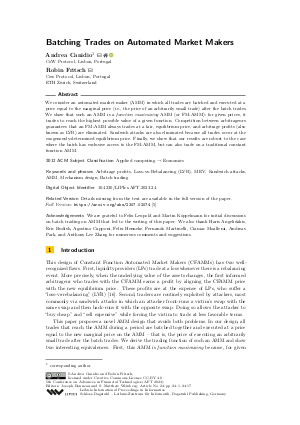Batching Trades on Automated Market Makers
Authors
Andrea Canidio  ,
Robin Fritsch
,
Robin Fritsch
-
Part of:
Volume:
5th Conference on Advances in Financial Technologies (AFT 2023)
Part of: Series: Leibniz International Proceedings in Informatics (LIPIcs)
Part of: Conference: Advances in Financial Technologies (AFT) - License:
 Creative Commons Attribution 4.0 International license
Creative Commons Attribution 4.0 International license
- Publication Date: 2023-10-18
File

PDF
LIPIcs.AFT.2023.24.pdf
- Filesize: 0.69 MB
- 17 pages
Document Identifiers
Related Versions
-
Details missing from the text are available in the full version of the paper.
- Full Version https://arxiv.org/abs/2307.02074
Subject Classification
ACM Subject Classification
- Applied computing → Economics
Keywords
- Arbitrage profits
- Loss-vs-Rebalancing (LVR)
- MEV
- Sandwich attacks
- AMM
- Mechanism design
- Batch trading
Metrics
- Access Statistics
-
Total Accesses (updated on a weekly basis)
0PDF Downloads0Metadata Views
Abstract
We consider an automated market maker (AMM) in which all trades are batched and executed at a price equal to the marginal price (i.e., the price of an arbitrarily small trade) after the batch trades. We show that such an AMM is a function maximizing AMM (or FM-AMM): for given prices, it trades to reach the highest possible value of a given function. Competition between arbitrageurs guarantees that an FM-AMM always trades at a fair, equilibrium price, and arbitrage profits (also known as LVR) are eliminated. Sandwich attacks are also eliminated because all trades occur at the exogenously-determined equilibrium price. Finally, we show that our results are robust to the case where the batch has exclusive access to the FM-AMM, but can also trade on a traditional constant function AMM.
Cite As Get BibTex
Andrea Canidio and Robin Fritsch. Batching Trades on Automated Market Makers. In 5th Conference on Advances in Financial Technologies (AFT 2023). Leibniz International Proceedings in Informatics (LIPIcs), Volume 282, pp. 24:1-24:17, Schloss Dagstuhl – Leibniz-Zentrum für Informatik (2023)
https://doi.org/10.4230/LIPIcs.AFT.2023.24
BibTex
@InProceedings{canidio_et_al:LIPIcs.AFT.2023.24,
author = {Canidio, Andrea and Fritsch, Robin},
title = {{Batching Trades on Automated Market Makers}},
booktitle = {5th Conference on Advances in Financial Technologies (AFT 2023)},
pages = {24:1--24:17},
series = {Leibniz International Proceedings in Informatics (LIPIcs)},
ISBN = {978-3-95977-303-4},
ISSN = {1868-8969},
year = {2023},
volume = {282},
editor = {Bonneau, Joseph and Weinberg, S. Matthew},
publisher = {Schloss Dagstuhl -- Leibniz-Zentrum f{\"u}r Informatik},
address = {Dagstuhl, Germany},
URL = {https://drops.dagstuhl.de/entities/document/10.4230/LIPIcs.AFT.2023.24},
URN = {urn:nbn:de:0030-drops-192139},
doi = {10.4230/LIPIcs.AFT.2023.24},
annote = {Keywords: Arbitrage profits, Loss-vs-Rebalancing (LVR), MEV, Sandwich attacks, AMM, Mechanism design, Batch trading}
}
Author Details
Acknowledgements
We are grateful to Felix Leupold and Martin Köppelmann for initial discussions on batch trading on AMM that led to the writing of this paper. We also thank Haris Angelidakis, Eric Budish, Agostino Capponi, Felix Henneke, Fernando Martinelli, Ciamac Moallemi, Andreas Park, and Anthony Lee Zhang for numerous comments and suggestions.
References
- Jun Aoyagi. Liquidity provision by automated market makers. working paper, 2020. URL: https://dx.doi.org/10.2139/ssrn.3674178.
-
Lorenz Breidenbach, Phil Daian, Florian Tramèr, and Ari Juels. Enter the hydra: Towards principled bug bounties and Exploit-Resistant smart contracts. In 27th USENIX Security Symposium (USENIX Security 18), pages 1335-1352, 2018.

-
Eric Budish, Peter Cramton, and John Shim. The high-frequency trading arms race: Frequent batch auctions as a market design response. The Quarterly Journal of Economics, 130(4):1547-1621, 2015.

- Andrea Canidio and Vincent Danos. Commitment against front running attacks, 2023. URL: https://arxiv.org/abs/2301.13785.
- Andrea Canidio and Robin Fritsch. Arbitrageurs' profits, lvr, and sandwich attacks: batch trading as an amm design response, 2023. URL: https://arxiv.org/abs/2307.02074.
- Agostino Capponi and Ruizhe Jia. The adoption of blockchain-based decentralized exchanges, 2021. URL: https://arxiv.org/abs/2103.08842.
- Chainlink. What is the blockchain oracle problem? Retrieved from https://chain.link/education-hub/oracle-problem on May 24, 2023, 2020. Online forum post.
- Nicolás Della Penna. Mev minimizing amm (minmev amm). Retrieved from https://ethresear.ch/t/mev-minimizing-amm-minmev-amm/13775 on May 24, 2023, september 1 2022. Online forum post.
- Matheus V. X. Ferreira and David C. Parkes. Credible decentralized exchange design via verifiable sequencing rules, 2023. URL: https://arxiv.org/abs/2209.15569.
-
Joshua S Gans and Richard T Holden. A solomonic solution to ownership disputes: An application to blockchain front-running. Technical report, National Bureau of Economic Research, 2022.

- Lioba Heimbach and Roger Wattenhofer. Sok: Preventing transaction reordering manipulations in decentralized finance. In Proceedings of the 4th ACM Conference on Advances in Financial Technologies, AFT '22, pages 47-60, New York, NY, USA, 2023. Association for Computing Machinery. URL: https://doi.org/10.1145/3558535.3559784.
- Josojo. Mev capturing amm (mcamm). Retrieved from https://ethresear.ch/t/mev-capturing-amm-mcamm/13336 on May 24, 2023, august 4 2022. Online forum post.
- Mahimna Kelkar, Fan Zhang, Steven Goldfeder, and Ari Juels. Order-fairness for byzantine consensus. Cryptology ePrint Archive, Paper 2020/269, 2020. URL: https://eprint.iacr.org/2020/269.
- F. Leupold. Cow native amms (aka surplus capturing amms with single price clearing). Retrieved from https://forum.cow.fi/t/cow-native-amms-aka-surplus-capturing-amms-with-single-price-clearing/1219/1 on May 24, 2023, november 1 2022. Online forum post.
- Jason Milionis, Ciamac C. Moallemi, and Tim Roughgarden. Automated market making and arbitrage profits in the presence of fees, 2023. URL: https://arxiv.org/abs/2305.14604.
- Jason Milionis, Ciamac C. Moallemi, Tim Roughgarden, and Anthony Lee Zhang. Automated market making and loss-versus-rebalancing, 2023. URL: https://arxiv.org/abs/2208.06046.
-
Andreas Park. Conceptual flaws of decentralized automated market making. Technical report, Working paper, University of Toronto, 2022.

-
Kaihua Qin, Liyi Zhou, and Arthur Gervais. Quantifying blockchain extractable value: How dark is the forest? In 2022 IEEE Symposium on Security and Privacy (SP), pages 198-214. IEEE, 2022.

- Geoffrey Ramseyer, Mohak Goyal, Ashish Goel, and David Mazières. Augmenting batch exchanges with constant function market makers, 2023. URL: https://arxiv.org/abs/2210.04929.
- Jan Christoph Schlegel, Mateusz Kwaśnicki, and Akaki Mamageishvili. Axioms for constant function market makers, 2023. URL: https://arxiv.org/abs/2210.00048.
-
Christof Ferreira Torres, Ramiro Camino, et al. Frontrunner jones and the raiders of the dark forest: An empirical study of frontrunning on the ethereum blockchain. In 30th USENIX Security Symposium (USENIX Security 21), pages 1343-1359, 2021.

